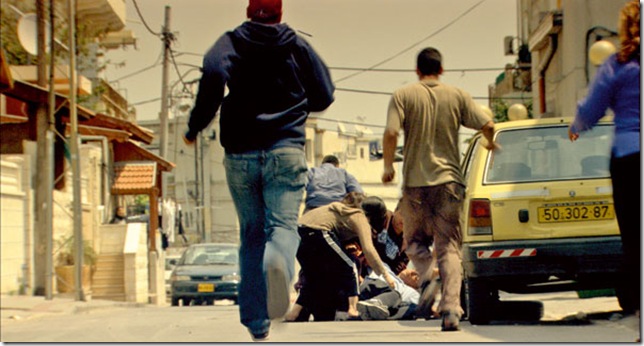There’s enough action in the opening five minutes of the Oscar-nominated Israeli film Ajami to fill the hourly quota of any prime-time drama: A young boy murdered, contract-style, in broad daylight while washing his car, a man defending himself by planting a bullet in a threatening, pistol-waving Bedouin mobster, that mobster’s family taking its paralyzing revenge on the shooter and his family.
Ajami’s assaulting prologue is a deadpan crime epic in miniature, shocking less in the brutality of the violence than in the unsentimental fashion in which it is presented. These are everyday events, stripped of manipulative musical cues, ostentatious camerawork and other artificial Hollywood trappings. We observe them as if we’re eyewitnesses on the street, not spectators tucked comfortably away in a plush theater seat.
We barely know the characters introduced in the dizzying introduction, but the sequence sets the tone for an uncompromisingly naturalistic, 2-hour immersion into a crime-filled world. Aside from the occasional title card dissecting the narrative into five chapters, we’re never reminded that we’re watching a movie, which gives the story a documentary-like aura of authenticity.
It’s an aura directors Scandar Copti and Yaron Shani worked for seven years to create, casting the movie entirely with nonprofessionals, filming with a pair of inexpensive handheld cameras, working without a screenplay, workshopping certain moments to perfection while filming other scenes guerrilla-style, surprising the actors with unplanned confrontations so as to achieve the most truthful responses.
Thus, it’s no surprise to learn that Copti and Shani culled their stories from real-life events in and around the Ajami neighborhood of Jaffa, the predominantly Arab city in Israel.
Characters include Omar (Shahir Kabaha), the 19-year-old, unwitting family patriarch caught in the blood feud of the film’s prologue and involved in a clandestine romance with a Christian Arab bartender; Malek (Ibrahim Frege), a Palestinian refugee hired illegally as a dishwasher to finance his sick mother’s life-saving surgery; Dando (Eran Naim), an Israeli police officer and family man obsessed with finding his missing, enlisted brother; and Binj (codirector Copti), a wealthy Palestinian drug dealer who risks alienating his proudly Arab friends by relocating to Tel Aviv with his Jewish girlfriend.
Their lives intersect in violent ways, some more schematic than others, but all filmed with utmost conviction and veracity. Ajami is a film that rewards close inspection and even casual note-taking, for even the most minute details early on have tragic consequences as the fatalistic narrative wends toward its conclusion.
It’s fair to say that non-Arabic, non-Hebrew speakers may have trouble keeping up with the narrative – this nonlinear multi-character mosaic is difficult enough to comprehend without having to read the swift barrage of subtitles. Because Cliff’s Notes aren’t an option, a second look at the film might help immensely, and Ajami is such a compelling experience that it’s surely worth multiple viewings.
What’s most refreshing about the film is its lack of preachy political propaganda. In this way, it couldn’t be further from 2009’s other highly distributed Israeli film, Lemon Tree, a didactic, self-aware allegory of Israeli-Palestinian strife. While Ajami’s conflicts between Jews, Muslims and Christian Arabs might seem to suggest, tangentially, the impossibility of a two-state solution in an era this fraught with violence, such transcendent readings are more the result of viewers searching for a message in the chaos, not by the chaos itself.
What we see on the screen is a lot more universal and accessibly exportable: We could just as easily be looking at the Crips and the Bloods or the Jets and the Sharks. Yes, the stories is grounded in real events, but Ajami feels less inspired by the depressing items in Jaffa police blotters than it does such abrasive arthouse affronts as Amores Perros and City of God – films whose copious amounts of tragic bloodletting are stanched by the overwhelming rush of cinema’s possibility to expose the reality in society’s fringes.
There’s not a “pretty” shot in Ajami, and it’s all the more memorable because of it.
John Thomason is a freelance writer based in South Florida.
AJAMI. Directors: Scandar Copti and Yaron Shani; Distributor: Kino International; Starring: Fouad Habash, Nisrine Rihan, Shahir Kabaha, Ibrahim Frege, Scandar Copti, Eran Naim. In Hebrew and Arabic with English subtitles. Rated: R. Opens: Friday. Venue: Regal Shadowood 16 and Sunrise Mizner Park 8 in Boca Raton, Regal Delray Beach 18, Sunrise Cinemas at Sunrise 11 and Sunrise Intracoastal 8 in North Miami Beach.
